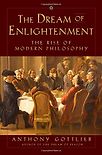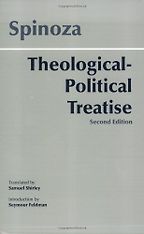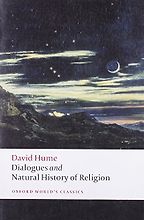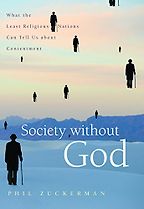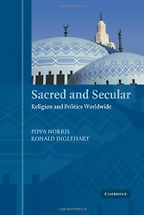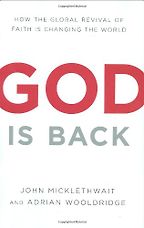Anthony, we’re going to talk about five books which weigh religion and secularism.
The first book that I’ve chosen is from a long time ago: 1670. It was written by Spinoza and published after his death. It’s called Tractatus Theologico-Politicus and there are a number of reasons why I think people should read it.
One is that it is way ahead of its time in its understanding of the human nature of traditional religion, and on the place of religion in society. Another reason, which has nothing particularly to do with religion, is that it’s intelligible, unlike Spinoza’s Ethics, which you really need to have studied quite a lot of philosophy to understand. The Ethics is the work of Spinoza’s that people try to read, but most of them get very little out of it. His Tractatus, by contrast, is intelligible to everybody. It doesn’t require any philosophical background, and gives you many of the main themes of Spinoza’s thought.
And what are those themes?
I suppose the most famous ideas expounded in the Ethics is that God is equivalent to nature, in some sense, and so should not be thought of as a personal being.
So, God is not like us?
God is certainly not like us: he doesn’t have emotions and wishes in the normal sense. So that’s one thing. But the first task Spinoza set himself in the Tractatus is to undermine the traditional notion of the Bible as the inerrant word of God. (In fact, the Tractatus is arguably the first serious work of biblical criticism.)
“The first task Spinoza set himself in the Tractatus is to undermine the traditional notion of the Bible as the inerrant word of God.”
He takes the five so-called books of Moses and shows why they probably aren’t by a single person, and certainly not by Moses. As he goes through the various books of the Old Testament, what he’s out to establish is that these writings reflect human ideas, and that they are the ideas of particular people expressed at a particular place and a particular time. Most educated people accept that now, but it was a horrifying idea to the religious establishment in Spinoza’s time.
So the Bible is man-made, and for this reason, nobody can use it to claim ownership of a divine authority?
No, and certainly not the Jews. Spinoza was Jewish by birth, though he was famously excommunicated by his synagogue, and one of the things he sets out to do in the book—and does, I think, very well—is attack the idea that the Jews were the chosen people, or more beloved by God than anybody else.
I think his books were also banned by the Catholic church?
Yes. He was generally thought of as an atheist, although he certainly wouldn’t have described himself as one. He thought he was just trying to show what God was really like, and in fact the German poet Novalis called him a “God-intoxicated man,” with some justice, because Spinoza never stops talking about God. Well, you can’t be both God-intoxicated and an atheist.
“Whether or not you think he was an atheist or a theist, he was certainly a secularist.”
But you can, of course, be both God-intoxicated and yet unimpressed by traditional Judaism. Spinoza thought that the rules by which Jews lived, as derived from the bible, merely reflected the circumstances of the early state of Israel, and because Israel no longer existed, and times had moved on, he thought these rules had become irrelevant. The dietary laws and so forth that bound the religious community of his time, and which continue to bind the orthodox, were all based, he felt, on a misunderstanding. It was a mistake to suppose that God wanted you to go on living like that even today.
Didn’t he choose circumcision in particular to exemplify the man-made nature of divine law?
Yes. Interestingly, he thought that circumcision was actually key to the survival of the Jews. It was a way in which they marked themselves out and bound themselves together. This was shocking at the time. Another thing that people found shocking was Spinoza’s notion of religious toleration and of the separation (for the most part) between church and state. Whether or not you think he was an atheist or a theist, he was certainly a secularist. He thought that religion had no part to play in politics. He was, by the way, writing in one of the most secular states at the time, where there was most religious freedom: Holland.
Can you tell me briefly how Spinoza conceives of God?
He thinks of God as identical with nature. This is a slight simplification of what he said, but it will do for now. This is a radical reinterpretation of the idea of God, but on the other hand Spinoza thinks that there is a supreme being who is omnipotent, omniscient and omnipresent—which are the traditional attributes of God. Because he does not think of God as a personal being, however, morality ends up being secularised. If God is not like a person, then we should not think of him as having desires in the ordinary sense, or as issuing commands, so we have to think of the relation between God and morality in a new way. Spinoza’s way is to say that God’s law is justice, charity and the love of one’s neighbour. If you let those things govern your life, then you are in fact following God’s law. That’s all it takes to be godly.
“If God is not like a person, then we should not think of him as having desires in the ordinary sense, or as issuing commands”
One thing that follows from that, of course, is that you can live a godly life while being an atheist. You might just want to do those things anyway, even if you think there is no God. Just so long as you are living a just and loving life, that’s the important thing about being godly. And I think it’s pretty plain that educated, moral, people today who are not religious would say, yes, that’s roughly what I think: if you want to talk about “God’s will”, you can say that living a moral life and doing God’s will come to the same thing. So Spinoza was a very modern thinker, a long, way ahead of his time.
One of the things that interested me about Spinoza was his rejection of Descartes’ mind/body dualism. He collapses the difference between the material and the spiritual world and in doing so he invites us to reject divine providence – the notion of a God who is different from nature and who is organising nature from outside. And by the same token he invites us to see that our own freedom is not so much the freedom to change what happens to us as to understand why it happens. Spinoza argues that once we understand this properly, we will understand that reality is the only perfection, and this is also what it means to become more godly.
Spinoza certainly had an unusual conception of freedom. To be free, for him, is to understand the ways in which you are determined. That is one of the hardest things to understand in Spinoza.
Whereas David Hume is very sceptical about the degree to which anything can be rationally understood at all, isn’t he? Including why or if the sun will rise tomorrow—to say nothing of the nature of God.
Yes, the difficulty of demonstrating rationally anything much about God is the focus of my second book, which is Hume’s Dialogues Concerning Natural Religion. This was published almost a hundred years after Spinoza’s Tractatus—again, it was published posthumously, because even in the relatively free-thinking atmosphere of late 18th century Edinburgh, Hume’s critique of religion was highly unacceptable. His friends urged him not only to give up the idea of having it published in his lifetime, but even of having it published after his death, because they thought that it would condemn all this other works to the dustbin of history. Nobody would read them, because they would write Hume off as a wicked unbeliever. But Hume insisted and took steps to ensure that the Dialogues would be published after his death, and he was right to have done so, because his works are now far from ignored. This one is probably the most read of all his books, and I think it’s arguably the masterpiece of English language philosophy.
That’s a terrific claim. Can you explain why?
The secret of its success is the way in which powerful and original arguments are woven into an elegant dialogue between three thinkers. The dialogue form is hard to pull off in philosophy, and Hume is one of the very few since Plato to be able to manage it. His announced topic here is “natural religion”. This is contrasted with “revealed religion”, and it means the sort of religious conclusions one can arrive at by reason rather than revelation. So for example, if somebody says “I know that Jesus wants me to do this, because he came to me in a vision,” or “because that’s my reading of scripture,” then that counts as revealed religion. On the other hand, if someone were to say that he is going to behave in a certain way, or that he believes in God, because of certain rational arguments, then that is natural religion.
“I think it’s arguably the masterpiece of English language philosophy.”
The part of natural religion that Hume focuses on in the Dialogues is something that is often called “the argument from design”, which is an argument for the existence of God that starts from the way the world works and is structured. The suggestion here is that the best explanation for what we observe is the existence of a designer—a god who made us. And this is of course a very familiar argument, with an intelligent, divine designer still offered by many people as a necessary supplement to science, as something that is still required by the evidence of complexity and apparent order in the universe.
What Hume does in his Dialogues is to undermine that line of thinking in a brilliant series of arguments that I don’t think have ever been bettered, let alone answered. They are more profound, I think, than the Darwinian critique of intelligent design. Hume, certainly would have endorsed natural selection if he had known about it. But it’s not enough to read Darwin and Dawkins. You have to read Hume as well to understand the flaws in the theistic argument from design.
What is it particularly that Hume offers that goes to the heart of the matter?
One of the key ideas is the limitations of arguing by analogy in this context, which is the way the argument from design usually works. Take, for example, a watch found lying in a forest. You might say to yourself: this watch cannot have come together by chance. Somebody must have designed it and made it. Then, by analogy, you might reason: surely nature wouldn’t work as it does unless there were a designer who made it. Now one of the many things that Hume points out is wrong with this kind of analogy is that even if you accept the analogy in principle, it still wouldn’t get you to the sort of God we’re after, but only to a superior intelligence who had made the world and the creatures in it. This intelligence wouldn’t necessarily be everlasting, omnipotent, or omniscient…
And would himself require a designer…
Well that’s one of the clinchers. If you’re going to ask where everything comes from and who designed it, you really do have to ask the same of God. So if you put forward God as the explanation for nature, you’re also going to have to ask who made God.
Yes, a devastating argument. And the finishing touch, isn’t it, is that if a designer requires no designer then why does nature require a designer? What is the need for God at all? Which brings us back to Spinoza, effectively collapsing the difference between God and nature.
Yes. And one of the most striking things that distinguishes these Dialogues from contemporary anti-religious books like, for example, Dawkins’s The God Delusion or Hitchens’ God is Not Great, is that none of Hume’s characters ever actually puts himself forward as an atheist or agnostic. Even Philo, whose views are closest to Hume’s own, pretends to be a believer. Hume’s technique is to pretend that he is the true defender of religion, that he is just trying to strengthen religion by shaving off the weaker bits. Now the thing is that when you have read and sympathised with all of Hume’s writings on religion, you realize that he has in fact shaved away everything. But that is why he manages to be so persuasive. He takes the reader very gently.
Like Socrates in the Thaeatetus.
Yes. It’s a very Socratic approach. And as an unbeliever myself, I think that technique is a much more effective way of showing religious people the error of their ways…
I’d wanted to ask you about that. What do you think about Hitchens’ God is Not Great…
I think it’s the best of the bunch of the recent atheist books, and I sympathize with most of its conclusions. But I do think that it strays very much into misanthropy. Because, if you believe, as Hitchens and Dawkins and I believe, that religion was invented by people, then to hate religion is to hate people. Well that’s my main disagreement. And I also think that Hitchens is too quick to attribute harm in human history to religion, whereas I think that religion has also had a lot of good effects. And where it has bad effects one has to remember that this is people using religion to their own ends. It’s not as if there’s a Satan out there who created religion and who’s doing all these bad things. If you really are a naturalist and you don’t believe in the supernatural or God, then you have to remember that the harm religion does is the harm that people do.
We’ve talked about Spinoza and Hume. Spinoza who believed in God but not in religion. Hume who did not, perhaps, believe in God at all.
Well if you were to ask Hume whether he believed in God or not, or alternatively, whether one simply could not answer questions of that kind in any sensible way, he would have to say the latter, though he certainly wasn’t tempted by any religious belief. He was a consistent and extreme empiricist. He thought that what the human mind could divine one way or another was very limited.
Hume also argues, by the same token, that it is not reason that is behind morality, but instinct and habit, and that God appeals precisely because so little can be understood or depended on. Which perhaps leads us to your last three books, which have all been written very recently.
Yes, the next three books I’ve chosen to talk about are all contemporary: one published just a few weeks ago, one last year, and one a few years before that. None of them are by philosophers. The first one, called Society Without God, is by a sociologist called Phil Zuckerman and is a study of a very particular phenomenon: religion in Scandinavia today. Now you might think, why bracket a sociologist with Spinoza and Hume? Well I wouldn’t on a philosophical reading list, but I think that if you’re interested in the relation between religion and secularism today, this book is essential.
“There really weren’t any atheists to speak of until quite far into the 18th century.”
It focuses on Denmark and Sweden, the two countries in which Zuckerman lived whilst working on the book. They are two of the healthiest and happiest societies in the world, in which most people simply do not give a fig about religion. It doesn’t play any meaningful role in their lives. Obviously there are some religious people there, but the proportion is much smaller than anywhere else. And this is a very interesting phenomenon, because throughout most of history, including the period in which Spinoza and Hume were writing, it was generally held, and is still held by a lot of religious people, especially Christian and Islamic fundamentalists, that a society of atheists must be an evil and unhappy place. For most of human history you didn’t even need to argue that. It was so obvious that atheists were evil.
Were there any societies of atheists at all?
There really weren’t any atheists to speak of until quite far into the 18th century. And it was in fact just at the beginning of the 18th century when Pierre Bayle, a famous French Enlightenment thinker, wrote a book which was ostensibly about comets, but which was in fact about all sorts of things, especially this. He made the suggestion that if there ever were a society of atheists, there was no reason to assume that they should not be just as good as the rest of us. A deeply shocking idea.
A fantasist? A science fiction writer?
Not at all. Bayle was writing about comets in order to talk about superstition and the idea of divine portents. More than three hundred years later we do actually have the sort of society he hypothesised, at least in Scandinavia. What Zuckerman finds is that most of the people who live in these countries are not explicit campaigning atheists, and many of them may well say that they do sort of believe in some sort of God, somewhere, somehow. They tend to get married in churches and to have funerals in churches, and even have baptisms. But these are purely social rituals, thought of in purely cultural, historical, national terms. What is plain, what makes them so different, is that otherwise religion plays no part in their lives. They don’t think about an afterlife. They certainly don’t follow any traditional or orthodox religion. What Zuckerman found about the Scandinavians is not that they are atheists in the mould of Dawkins and Hitchens but that they just couldn’t care one way or another.
So not even agnostics, who in theory are still working on the problem?
Couldn’t even be bothered with that. The questions simply don’t arise. And yet here is the really striking thing. However you want to measure a society’s health—whether it is literal, physical health, social welfare, education, happiness, living standards, life expectancy—these countries are at the top. So here is very convincing proof that it is perfectly okay not to be a believer.
A high suicide rate, though.
Perhaps, but I think that has more to do with the long dark winters than the absence of religious devotion. And the suicide rate is certainly not high enough to dent the overall life expectancy of Scandinavians. No, given what Zuckerman has to say, I think it would be very useful for the American religious right—those who warn that society would collapse without religion—to consider how happy the Danes and Swedes seem to be.
Clearly Spinoza and Hume are revolutionary in so far as they are prepared to talk about the possibility of God without religion, or gesture at the notion of no God at all. But the modern authors that you’re talking about are perfectly at liberty to talk about these things.
Yes, they can be more open, because they won’t be hanged for it.
And in consequence they are not marginal, but involved in an ongoing discussion. One of the anomalies in this discussion is America. And here we are sitting in your apartment in New York. So shall we talk about America?
Yes, both of the next books on my list have something particular to say about America. My fourth book is by two social scientists called Pippa Norris and Ronald Inglehart. It’s called Sacred and Secular: Religion and Politics Worldwide. It was published in 2004 and is meticulous and powerful in its interpretation of an enormous range of data. What they’re looking at are the data on religious practices in the world today and the extent to which they can be correlated, country by country, with various socioeconomic variables. Now, many books and articles on the state of religion are remarkably data-free, or get muddled in their account of the data, and this one is the antidote.
People prefer revealed atheism to natural atheism?
They prefer colourful stories, newspaper headlines and poorly digested and collected opinion-poll data. Norris and Inglehart do use poll data, among other sources, but only the best sort, carefully vetted and cross-referenced to determine church attendance and so forth. The other sort of data this book relies on is data about education, health, wealth, the distribution of wealth, life expectancy and so on. Because what the authors are looking at in this book is what’s called the “secularisation thesis”, which says roughly that the more modern or economically developed a country gets, the less religious it is.
“America is a very modern, economically developed country, yet its level of religiosity is much more like an undeveloped country. ”
So they are trying to examine that thesis, and they find a great deal to support it, but with one important tweak. And this tweak is what enables them to explain America. Because, of course, America is a very modern, economically developed country, yet its level of religiosity is much more like an undeveloped country. All the other rich countries in the world—not just the European ones, but all of them—are significantly less religious than America. The extreme contrast is with Scandinavia, the others tend to be somewhere between the two, but the difficulty for the secularisation thesis has always been America.
So how do they explain America?
What they propose is that religion declines not simply because of economic development, but when that economic development brings with it the security that you would expect it to bring, which they call “existential security”. Now what they argue is that America is much more like a poor country than a rich one in that many of its citizens do not enjoy this security. Take life expectancy, which is the most basic measure of social welfare. Now, if you were to rank the countries of the world by life expectancy, with the longest lived at the top, where roughly would you expect America to be?
I suppose in the top ten, at least.
Everyone assumes that. But it is not in the top ten. It’s not in the top 20 or 30 or 40. It’s number 43, according to the United Nations. And the biggest single reason for that is that tens of millions of Americans cannot afford health care, though there are other factors too.
That’s almost impossible to believe.
Yes, and I think it would surprise most Americans. But it’s certainly correct. Now amongst the other relevant differences between America and the rest of the developed world is the fact that you’re much more likely to die through violence in America or to die in a natural disaster. And if you lose your job—and there’s a higher turn-over or “churn” in jobs than in many other places—then much worse things are going to happen to you, because there’s much less of a supporting welfare state than exists in Western Europe and elsewhere. So to cut a long story short, life here in America is, for an awful lot of people, very much more worrying than it is for people in other rich countries—an intractable fate seems to play a bigger role—and that affects the culture and climate of opinion. In America, you need God, because nobody else is going to help you.
“In America, you need God, because nobody else is going to help you.”
Now, for Norris and Inglehart this is not the sole explanation for the popularity of religion in America. It’s a big, complex subject—for example, you don’t have to spend a long time in America to realise that religious organisations here provide much of the social networking for a relatively mobile, rootless culture. But if you take this research into account, the relative lack of existential security here, you begin to understand how the secularisation thesis in general is correct: that countries do tend to become less religious as they become more economically successful and developed. And America is an exception because a lot of what usually comes with economic development hasn’t come in America.
I suppose if one were to think of Scandinavia and the States, one thing that might spring to mind is the relationship between the individual and the government. That in Scandinavia the majority of people appear to be relatively comfortable with government, that they do not resent it, that they trust it. Whereas in the States, if you think of the constitution, much of it is there to protect the citizen against over powerful government. And that historically America’s Founding Fathers were religious men fleeing persecution by their government.
Well, there are many distinctive and interesting things going on in America, many things that make it religious. It’s certainly not just the relatively low life expectancy and so on. It’s other things too. And these other things are discussed quite a lot in the last book on my list—a book by two British journalists, John Micklethwait and Adrian Wooldridge, called “God is Back: How the Global Revival in Faith is Changing the World”. It came out a couple of weeks ago, the title is fairly self-explanatory, and what they argue is that religion is back, or that it certainly isn’t in decline. The book’s quite careful and subtle, and there are various strains in it, but the main thrust is that modernity brings not necessarily secularism but rather pluralism—in other words a lot of freedom to adopt and adapt the religion of your choice.
What makes this book valuable is that it has up to date research from Asia, Latin America, Eastern Europe and Africa where there are all sorts of unexpected religious developments. The huge growth of Pentecostalism, for example, in Latin America; the rise of Christianity in Africa; the coming battles between Christianity and Islam in Africa. God is certainly back in the headlines, 9/11 and Islamic fundamentalism saw to that. But that’s not all. Religion is for various reasons in the headlines. One of the other reasons is mobility. Immigration brings clashes of separate cultures, including religious cultures. When you get a lot of immigrants practicing their own religion, the natives tend to practice their religion even more vehemently. So there’s a lot of religious activity going on.
So is God back?
In a limited sense, perhaps. He’s in the headlines, as I said. And he’s certainly bouncing back in formerly communist countries. So it is probably true that there are fewer unbelievers now than there were when communism had not yet begun to collapse. But the secularism thesis, I think, still holds true, and the long-term trend is against religion: in the course of the 20th century, unbelief (though it is still globally very much a minority position) has grown much faster than any religion.
However, over the next 100 years, we may see a rise in believers in wealthy countries: this will not be because of people rediscovering God or changing their minds, but because of migration from poorer countries and because believers tend to have more children than unbelievers. I think the authors of God is Back believe that the secularisation thesis is just plain wrong, whereas I believe it is broadly correct. But the continuing decline of religion, as economies develop, will undoubtedly be a long and rocky road, and I certainly don’t think that religion will ever disappear completely. There may be many factors that delay the decline of religion. But I think that’s where we’re heading.
September 22, 2013
Five Books aims to keep its book recommendations and interviews up to date. If you are the interviewee and would like to update your choice of books (or even just what you say about them) please email us at [email protected]
Support Five Books
Five Books interviews are expensive to produce. If you've enjoyed this interview, please support us by donating a small amount.

Anthony Gottlieb
Anthony Gottlieb is a historian of ideas and former Executive Editor of The Economist. He has written The Dream of Reason: A History of Western Philosophy from the Greeks to the Renaissance and The Dream of Enlightenment: The Rise of Modern Philosophy. As of October 2017, Anthony is a fellow at All Souls, University of Oxford.

Anthony Gottlieb
Anthony Gottlieb is a historian of ideas and former Executive Editor of The Economist. He has written The Dream of Reason: A History of Western Philosophy from the Greeks to the Renaissance and The Dream of Enlightenment: The Rise of Modern Philosophy. As of October 2017, Anthony is a fellow at All Souls, University of Oxford.

